- EXPLORE Random Article

How to Score a 9 on an AP English Essay
Last Updated: August 11, 2021 References
This article was co-authored by Christopher Taylor, PhD . Christopher Taylor is an Adjunct Assistant Professor of English at Austin Community College in Texas. He received his PhD in English Literature and Medieval Studies from the University of Texas at Austin in 2014. There are 9 references cited in this article, which can be found at the bottom of the page. This article has been viewed 317,883 times.
Are you a high school AP English Student? The AP English Language and Composition essay is part of the final exam to determine if you get your Advanced Placement (AP) English credit, freeing you from 1 or 2 composition classes in college. To formulate a top-level AP English essay, some preparation is required in addition to your AP English class. Remember that you will be working under a time constraint of 2 hours for 3 essays (the College Board calls them "free response"). [1] X Research source
Developing a Strong Essay

- You can check out past essay prompts at https://apcentral.collegeboard.org/courses/ap-english-language-and-composition/exam .
- Be aware of the time constraints as you do your sample essays. Practicing with the time pressure will help you fit everything in on exam day. Keep in mind that you have 120 minutes to write 3 essays.

- The first prompt on the exam is “synthesis.” You’ll read various texts on the same topic and craft an argument that synthesizes these texts. [3] X Research source
- The second prompt is “rhetorical analysis.” A non-fiction work will be provided for you to analyze the intended meaning based on the writer’s use of language. [4] X Research source
- The third prompt is “argument.” You must craft an argument based on a given topic. [5] X Research source
- Make notes in the margins and underline key parts of the prompt. Follow the acronym SOAPSTone to help you answer key questions about the prompt: Speaker, Occasion, Audience, Purpose, Subject, Tone. [6] X Research source

- You may want to include the basic gist of the evidence you have gathered as part of your thesis sentence. For example, a thesis statement can follow this format: your argument + 3 reasons why. For example: ___________ is true because ___________, _________, and ___________.
- A thesis statement may sound like this, “By combining the concepts of artistic expression and creative license, Van Gogh’s Starry Night becomes the epitome of the ideal night sky.”
- A thesis sentence usually appears at the end of the intro paragraph, often as the very last sentence.

- If the prompt provides you with a passage to analyze, underline quotes that will support your thesis. Then think of examples independent from the text that will support it.
- Having a list of evidence to choose from as you go makes writing your essay that much faster.

- Make sure the flow of the essay is logical, going in order of occurrence if you are using events as examples, or making sure that you don’t present one example without first introducing where you might find it.
- The first paragraph is the intro paragraph, followed by at least 3 body paragraphs, and ends with a conclusion sentence. Map out this outline on paper before starting the essay. [10] X Research source
- You may find it useful to fill in topic sentences in the outline before writing the essay so that you can stay focused when writing the essay.
Writing the Essay

- In this paragraph, you should introduce the author and title of any literature you are analyzing, followed by a reiteration (though not repetition) of the prompt. You should also include any literary elements that would help your analysis. [12] X Research source
- Literary elements include character, setting, tone, etc.

- It is also useful to use transition words in the topic sentences to make the essay flow better. Use words or phrases like “also,” “likewise,” “in addition,” and so on. [13] X Research source

- Make sure you frame each quote or example so that it connects to the topic sentence. [14] X Research source
- You can accomplish this by “sandwiching” the quotes/examples between a sentence that introduces them followed by one or more sentences that explain them.
- Avoid using quotes longer than 4 lines. In MLA format, which is standard for many English papers, a quote that is longer than 4 lines (or 3 lines of a poem) must be “blocked,” or given a 1 inch (2.5 cm) margin. This formatting can take valuable time away from your writing, and you need every moment you can spare. [15] X Research source

- Finish the conclusion paragraph with a sentence that challenges the reader without bringing in new ideas. This sentence can push the reader to think about your topic for themselves.
- For example, your last sentence might be, “In this day and age, this topic is definitely something every college student should be thinking about.”
Polishing Your Essay

- Use transition words to connect sentences within paragraphs, not just between them, such as “also” and “likewise.”

- For example, make sure your large vocabulary word makes sense: "The methods were carried out with perfect punctilio."
- You could also write, "The defalcation of the government this fiscal year is appalling."

- Grammar is learned over time through reading and school classes, but a basic review of grammar during your AP studies is helpful.
- Review things like sentence structure, subject-verb agreement, pronoun agreement, and so on.
Community Q&A
- If you're given a topic you don't much care about, or simply can't relate to, make it relate to you. Use metaphors and life experiences you actually enjoy to bring an element of passion to the piece. Thanks Helpful 0 Not Helpful 0
- Become an avid reader of all different types of literature in order to get a good sense of how to use vocabulary and grammar usage to its advantage in your writing. This will also help you develop the ability to vary types of sentences and use solid transition words appropriately. Thanks Helpful 0 Not Helpful 0
- When they're ready you can check your scores online. Thanks Helpful 0 Not Helpful 0
You Might Also Like

- ↑ https://apstudent.collegeboard.org/apcourse/ap-english-literature-and-composition/about-the-exam
- ↑ http://apcentral.collegeboard.com/apc/members/courses/teachers_corner/17306.html
- ↑ https://apcentral.collegeboard.org/courses/ap-english-language-and-composition/exam
- ↑ http://apcentral.collegeboard.com/apc/public/preap/teachers_corner/45200.html
- ↑ https://www.apstudynotes.org/english/sample-essays/thesis-statements/
- ↑ http://classroom.synonym.com/write-argumentative-paper-ap-english-4883.html
- ↑ http://www.mshogue.com/AP/writing/AP%20Essay%20Planning%20Guide.PDF
- ↑ http://www.smart-words.org/linking-words/transition-words.html
- ↑ https://owl.english.purdue.edu/owl/resource/747/03/
About this article

Reader Success Stories
Tim Sanders
Jan 30, 2019
Did this article help you?
- About wikiHow
- Terms of Use
- Privacy Policy
- Do Not Sell or Share My Info
- Not Selling Info

AP® English Language
The best ap® english language review guide for 2024.
- The Albert Team
- Last Updated On: February 7, 2024
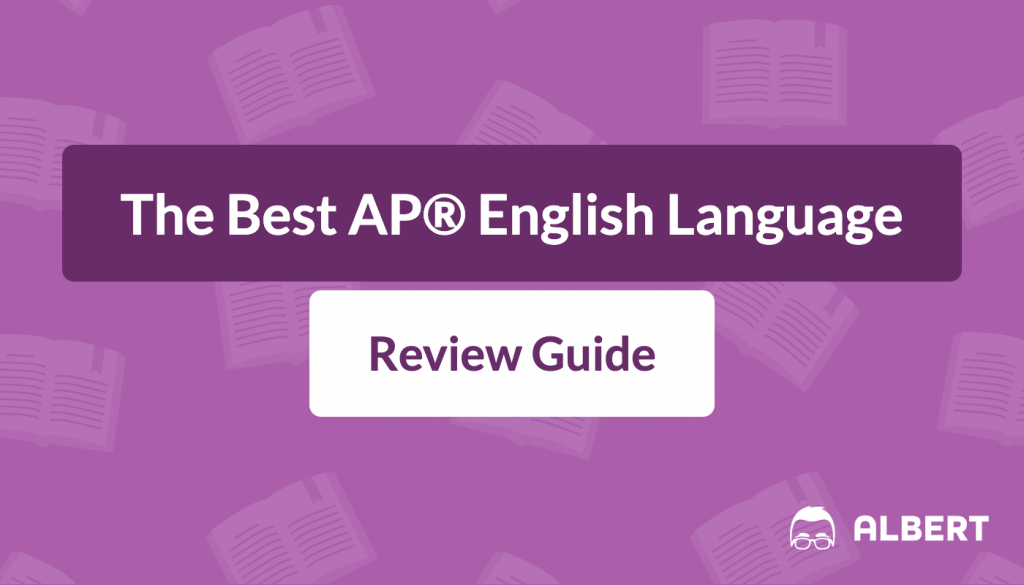
Navigating the AP® English Language exam is tough. That’s why we wrote this comprehensive AP® English Language study guide.
In this post, we’ll go over key questions you may have about the exam, how to study for AP® English Language, as well as what review notes and practice resources to use as you begin preparing for your exam.
Are you ready? Let’s get started.
What We Review
What’s the Format of the AP® English Language and Composition Exam?
The AP® English Language and Composition exam is broken into two sections: multiple-choice and free-response.
Students are asked to complete 23-25 reading questions focused on rhetorical analysis and 20-22 writing questions focused on making revisions related to diction, syntax, and other grammar concepts. The number of free-response questions remains the same, but they are now scored using an analytic rubric rather than a holistic rubric.
How Long is the AP® English Language and Composition Exam?
The AP® English Language and Composition exam is 3 hours and 15 minutes long. Students will have 1 hour to complete the multiple-choice section (45 questions) and 2 hours and 15 minutes to complete the free-response section (3 questions).
How Many Questions Does the AP® English Language and Composition Exam Have?
Section i: multiple choice.
- 5 passages total: 2 Reading and 3 Writing
- 23–25 Reading questions
- 20–22 Writing questions
Section II: Free Response
- 1 Synthesis question
- 1 Rhetorical Analysis question
- 1 Argument question
Return to the Table of Contents
What Topics are Covered on the AP® English Language and Composition Exam?
There are two types of AP® English Language and Composition questions: multiple-choice and free-response.
Because AP® English Language and Composition is a skills-based course, there’s no way to know what specific passages or topics might make it onto the official exam.
However, we know exactly which skills will be assessed with which passages, so it’s best to center your studying around brushing up on those skills! The charts below will help you understand which skills you should focus on.
Note that, even though there are more writing passages, reading passages have a greater total number of questions.
Like the multiple choice section, the free response section is also skills-based. We cannot predict what specific passages you will be asked to analyze, but we do know the type of essays you will be asked to produce:
- 1 Synthesis essay: After reading 6-7 sources, students are asked to write an essay using at least 3 of the provided sources to support their thesis.
- 1 Rhetorical Analysis essay: Students read a non-fiction text and write an essay that analyzes the writer’s choices and how they contribute to the meaning and purpose of the text.
- 1 Argument essay: Students are given an open-ended topic and asked to write an evidence-based argumentative essay in response to the topic.
What do the AP® English Language and Composition Exam Questions Look Like?
Multiple choice examples.
The Course and Exam Description (CED) for AP® English Language provides 8 practice questions that address reading skills and 9 practice questions that address writing skills.
Below, we’ll look at examples of each question type and the skills and essential knowledge they address.
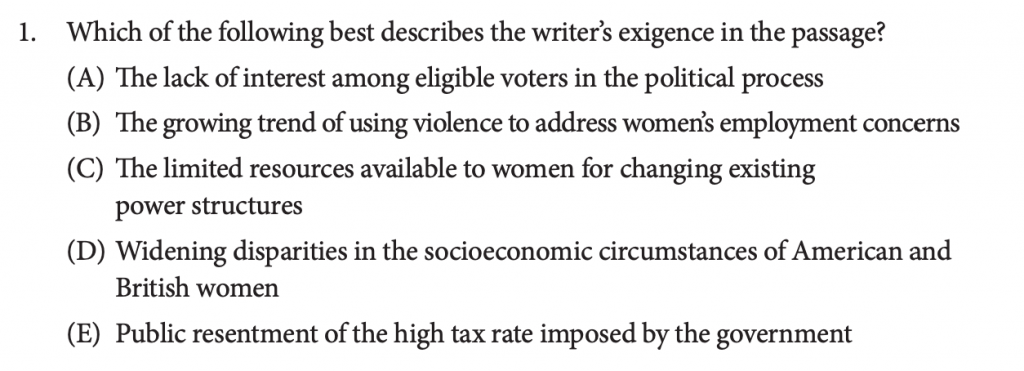
Skill: 1.A Identify and describe components of the rhetorical situation: the exigence, audience, writer, purpose, context, and message.
Essential Knowledge: RHS-1.B The exigence is the part of a rhetorical situation that inspires, stimulates, provokes, or prompts writers to create a text.
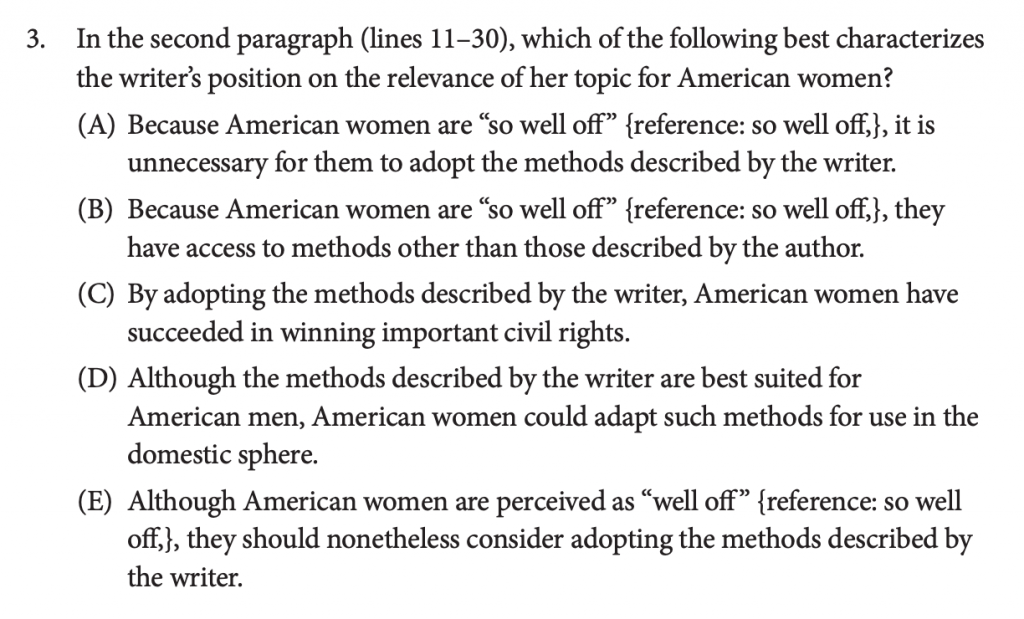
Skill: 3.A Identify and explain claims and evidence within an argument.
Essential Knowledge: CLE-1.A Writers convey their positions through one or more claims that require a defense.
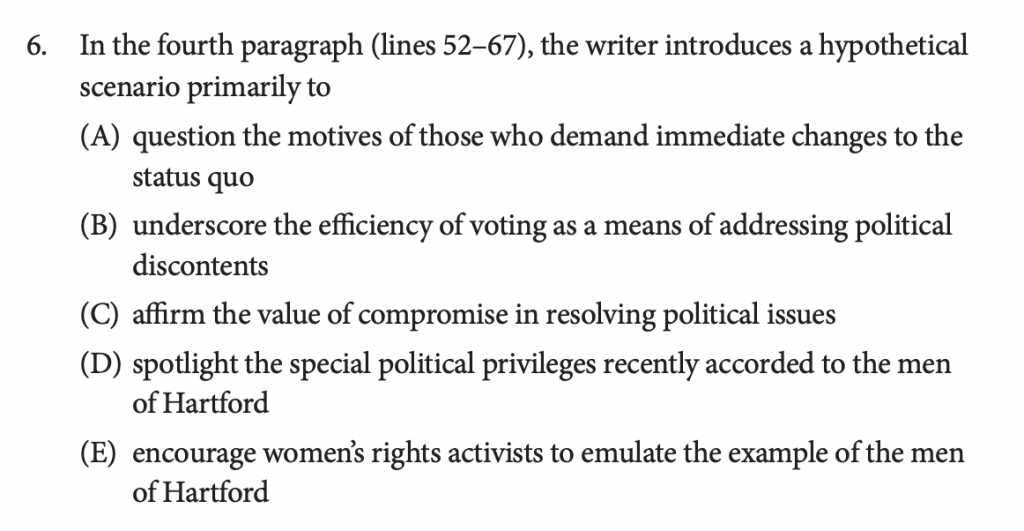
Skill: 5.C Recognize and explain the use of methods of development to accomplish a purpose.
Essential Knowledge: REO-1.J When developing ideas through cause-effect, writers present a cause, assert effects or consequences of that cause, or present a series of causes and the subsequent effect(s).
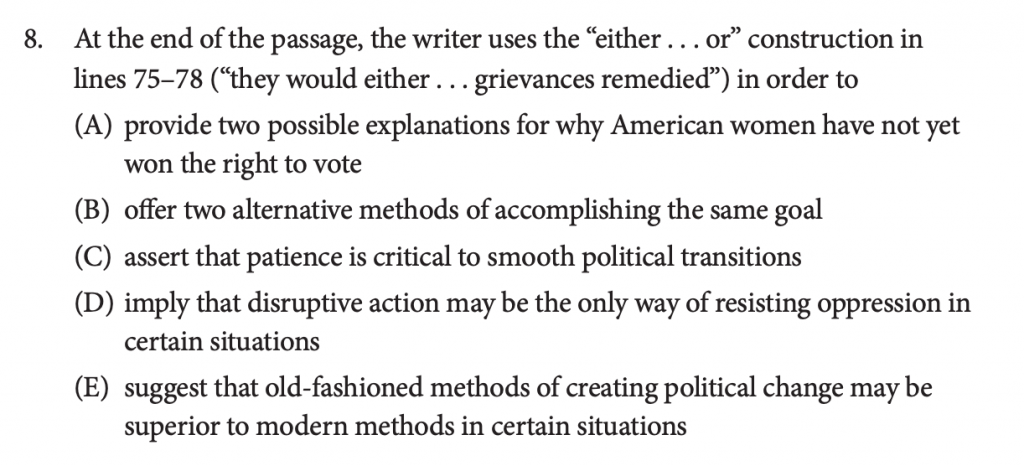
Skill: 7.B Explain how writers create, combine, and place independent and dependent clauses to show relationships between and among ideas.
Essential Knowledge: STL-1.L The arrangement of clauses, phrases, and words in a sentence can emphasize ideas.
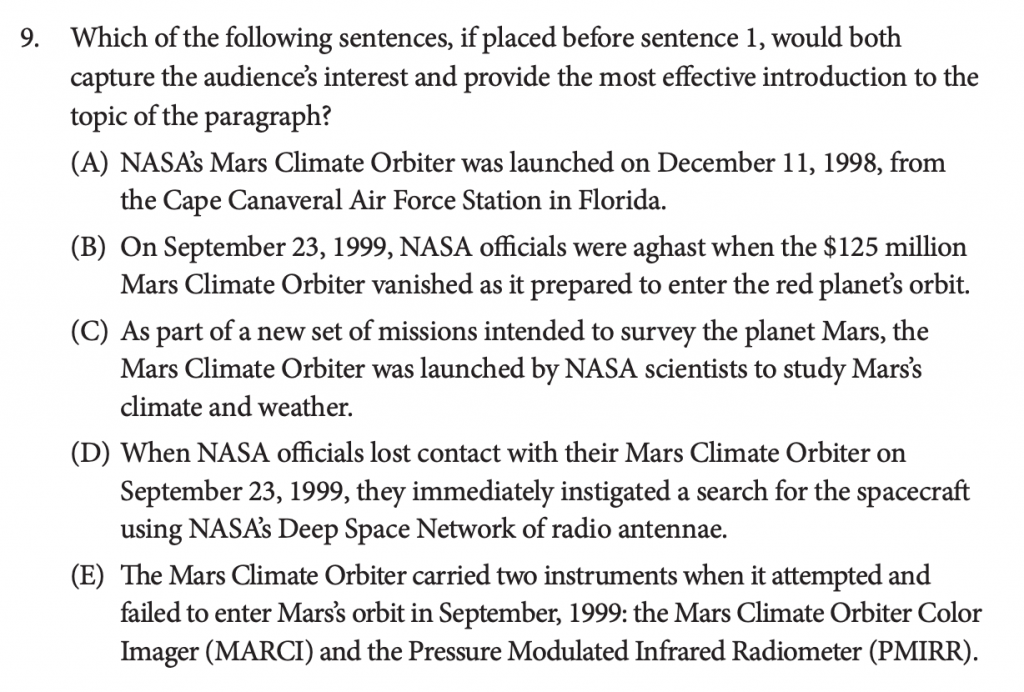
Skill: 2.A Write introductions and conclusions appropriate to the purpose and context of the rhetorical situation.
Essential Knowledge: RHS-1.I The introduction of an argument introduces the subject and/ or writer of the argument to the audience. An introduction may present the argument’s thesis. An introduction may orient, engage, and/or focus the audience by presenting quotations, intriguing statements, anecdotes, questions, statistics, data, contextualized information, or a scenario.
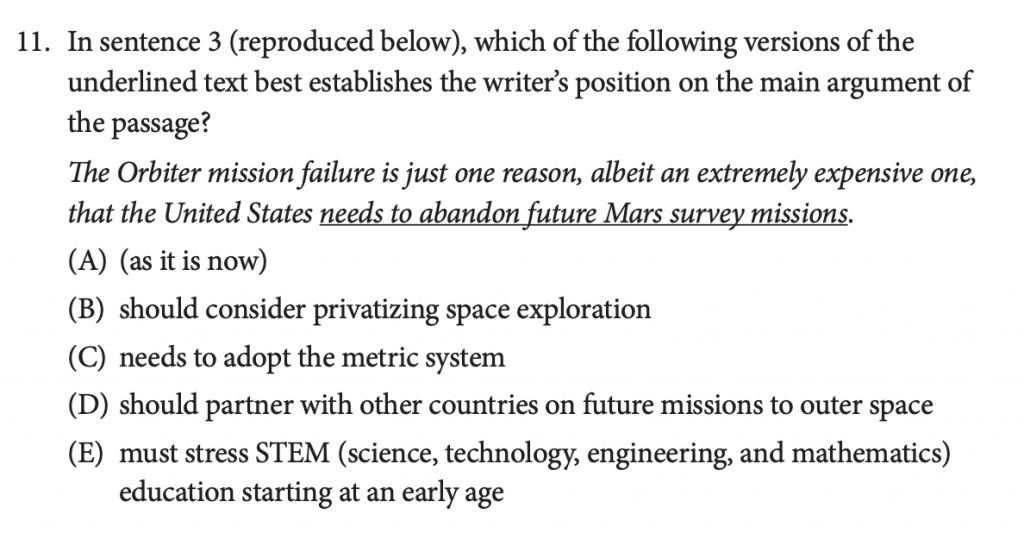
Skill: 4.B Write a thesis statement that requires proof or defense and that may preview the structure of the argument.
Essential Knowledge: CLE-1.I A thesis is the main, overarching claim a writer is seeking to defend or prove by using reasoning supported by evidence.
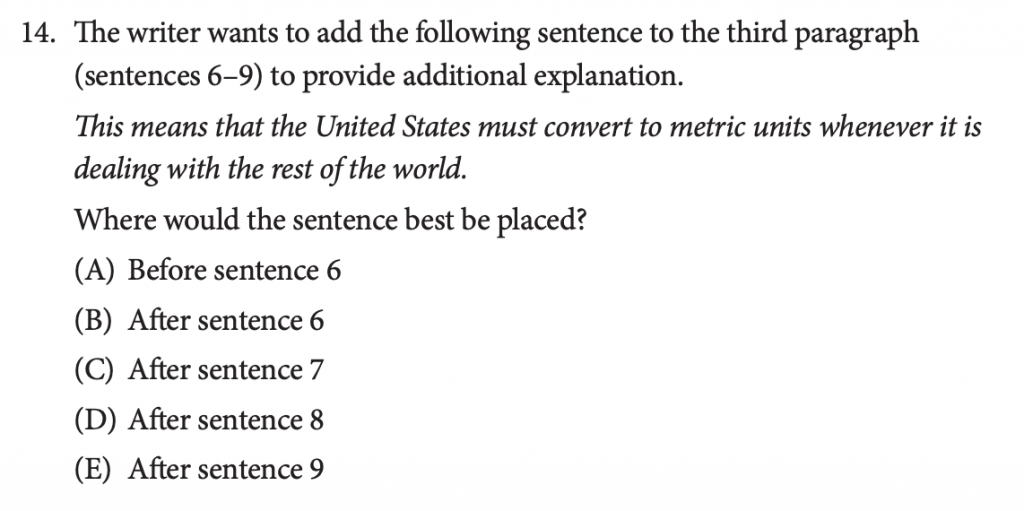
Skill: 6.A Develop a line of reasoning and commentary that explains it throughout an argument.
Essential Knowledge: REO-1.D Commentary explains the significance and relevance of evidence in relation to the line of reasoning.
Free Response Examples
The Course and Exam Description (CED) for AP® Lang also provides a sample question for each FRQ. Below, we’ll review these examples and which skills they address.
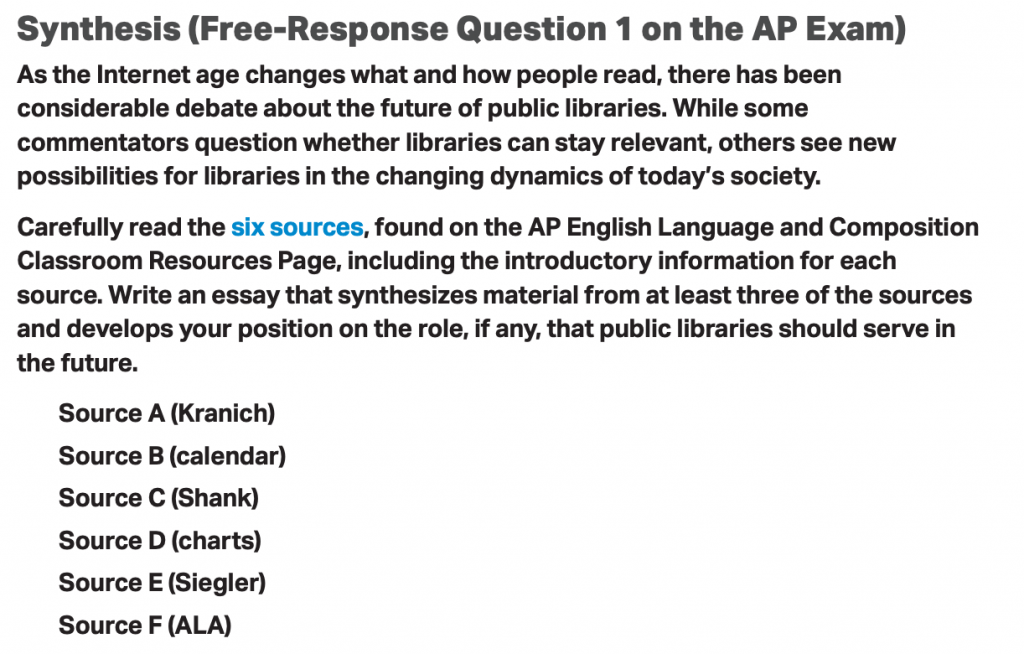
Skills: 2.A, 4.A, 4.B, 4.C, 6.A, 6.B, 6.C, 8.A, 8.B, 8.C
This prompt is long, but it’s important to notice the key task:
- Write an essay that synthesizes material from at least three of the sources and develops your position on the role, if any, that public libraries should serve in the future.
So, your response should:
- Synthesize the material from at least three sources
- Make your position on the topic clear
In a bit, we’ll have a look at the rubric and see this in action.
Rhetorical Analysis
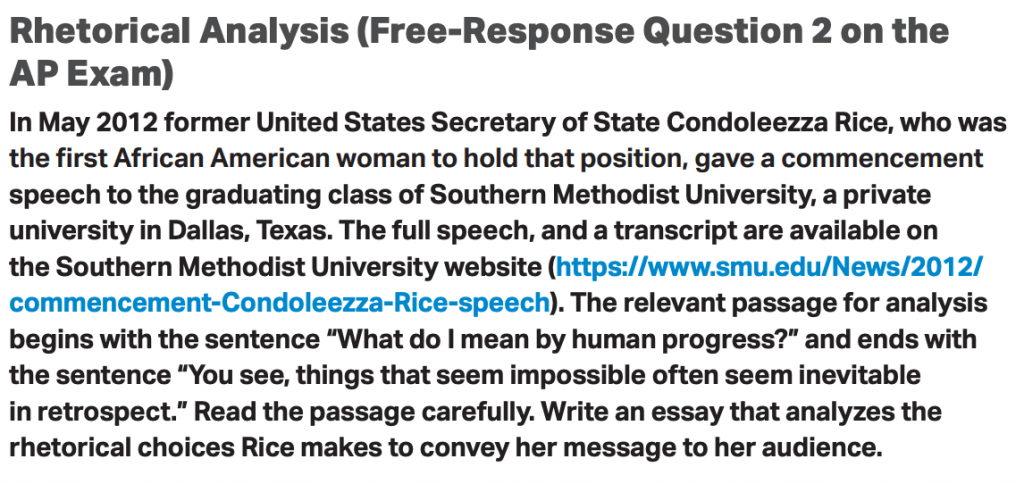
Skills: 1.A, 2.A, 4.A, 4.B, 4.C, 6.A, 6.B, 6.C, 8.A, 8.B, 8.C
The key task in this prompt is to:
- Write an essay that analyzes the rhetorical choices Rice makes to convey her message to her audience.
- Analyze the author’s rhetorical choices
- Connect those choices to the author’s message and how it’s conveyed to the audience
We’ll also have a look at this rubric and learn how these points can be earned.

The key task here is:
- Write an essay that argues your position on Jordan’s claim that “private wants” threaten national identity.
- Use evidence to back up your position
We’ll break down this rubric in a bit.
Free Response Rubric Breakdowns
With the 2020 redesign came new rubrics for the AP® Lang essay section. Previously, essays were scored using holistic rubrics, on a scale of 0-9. Starting with the 2019 exam, students’ essays will be graded with new analytic rubrics. Each essay is worth up to 6 points.
Switching to an analytic rubric from a holistic rubric can be tricky, especially if you’ve already taken another AP® English class and are used to the holistic version. But, the best thing about an analytic rubric is that it tells you exactly what to include in your essay to earn maximum points.
Think of the new rubrics as a How To Guide to getting a 6 on each essay. Below, we’ll spend some time breaking down each element of each rubric, but first let’s take a look at the Thesis point, which is pretty similar across all 3 essays.
Row A: Thesis
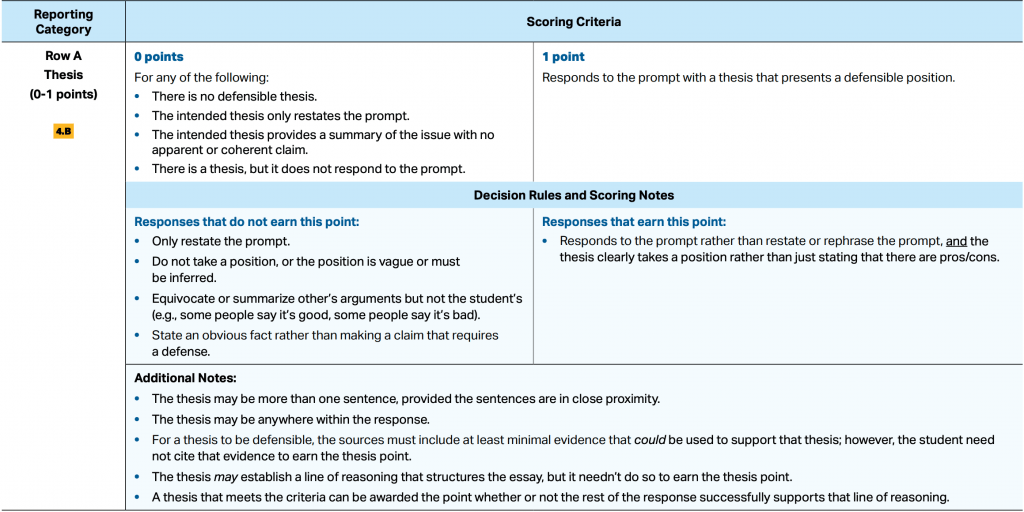
The Thesis row is all or nothing — you either earn the point or you don’t. It’s important to learn the wording of the rubric to make sure you are crafting an AP-level thesis. Note that you will not earn the point if your thesis:
- Just restates the prompt
- Summarizes the issue without also making a claim
- Doesn’t respond to the prompt
That’s all pretty straightforward, but earning the point for this category is a little more tricky than it seems at first. You will earn the point if your thesis:
- Responds to the prompt with a defensible position
- Takes a clear position that does not simply state there are pros and cons to the issue
Notice the second point above. While you may want to include a counterargument in the body of your essay (more on this later), your thesis is not the place to do so.
The purpose of presenting a counterargument is to refute it then and make your own argument stronger. Presenting the opposing argument in your thesis gets confusing for a reader and can make it seem like you aren’t holding strong in your own position, so it’s best to save that for the body of your essay.
The Additional Notes section of the rubric is also important to understand. This details what may or may not earn the thesis point. The main takeaways here are:
- Your thesis may be more than one sentence, as long as those sentences are near one another
- Your thesis doesn’t have to be in your opening paragraph
- Your sources must support your thesis, but you do not necessarily need to cite them
- Your thesis doesn’t have to outline your argument
- Your thesis statement can earn the point independent of whether or not your essay supports it on the whole
The Synthesis Rubric
As we’ve already discussed, the synthesis essay is the first of the three. You will be presented with 6-7 sources related to a given topic and asked to write an essay using at least 3 of those sources to support your thesis.
Let’s take a look at the various elements of the rubric and how you can earn maximum points for each category.
Row B: Evidence and Commentary
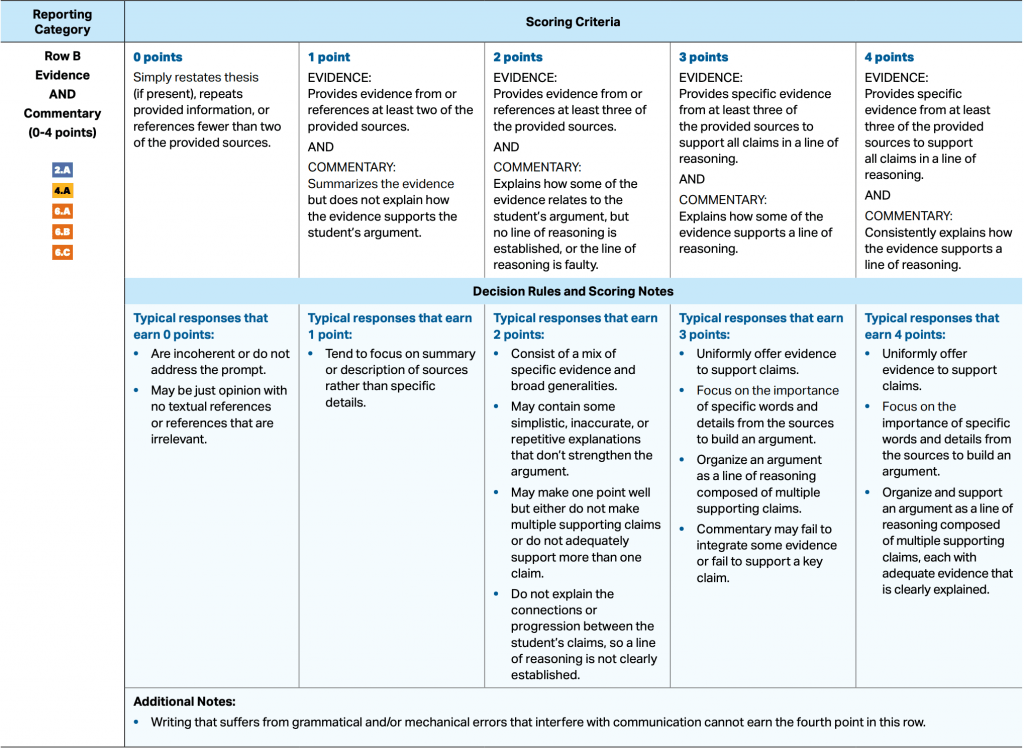
The Evidence and Commentary row is a little more flexible than the Thesis row. You can earn between 0 and 4 points depending on the quality of the evidence and commentary that you provide. Note you will not earn any points if your evidence and commentary:
- Does nothing more than restate your thesis
- Repeats already given information
- References fewer than 2 of the sources
- Is just opinion without any textual evidence
The nice thing about this section is that there are lots of places you can earn points! You will earn full points if your evidence and commentary:
- Contains specific evidence from at least 3 of the sources
- Fully supports your claim and line of reasoning
- Explains how the evidence supports your claim and line of reasoning
- Pulls specific words or details from the sources that support your argument
- Supports a line of reasoning that is broken down into supporting claims, with each supporting claim supported by its own pieces of evidence
The final point in the above list is the main difference between earning full points and partial points in this section. AP-level evidence and commentary will not only support your overall claim, but will also support your supporting claims fully.
You can think of supporting claims as each individual body paragraph’s focus. If each body paragraph makes a supporting claim, and that supporting claim is bolstered by specific supporting evidence, you are much more likely to earn the full 4 points here.
The Additional Notes section of the rubric is also important to understand. This gives extra detail on what may or may not earn the thesis point. The main takeaway here is that your argument must be free of grammatical and/or mechanical errors in order to earn full points. This means that if your grammar is not solid, you can only ever earn 3 or fewer points in this section.
If you struggle with grammar or syntax, check out Albert’s Grammar course to help build up those skills!
Row C: Sophistication
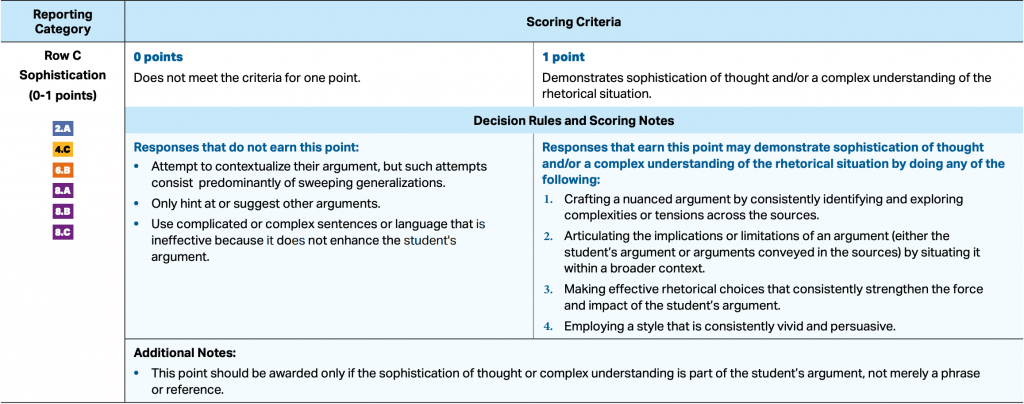
Similar to the Thesis point, the Sophistication row is also all or nothing — you either earn the point or you don’t.
Where the Sophistication point differs from the Thesis point is that it’s a bit more difficult to understand how to earn it! The rubric states that essays that earn the point “demonstrate sophistication of thought and/or a complex understanding of the rhetorical situation.”
In plain English, this means that you will not earn the point if your essay:
- Contains sweeping generalizations
- Only hints at other positions on the argument
- Uses complex sentences or language that doesn’t add anything to the argument
You will earn the point if your essay:
- Explores complexities or tensions between the provided sources, creating a more nuanced argument
- Acknowledges implications or limitations of your own argument through counterarguments
- Acknowledges implications or limitations of the sources’ arguments by situating them within the broader context of the argument
- Makes purposeful rhetorical choices that strengthen your argument
- Uses vivid and persuasive style
Note that you will not earn the point for this section if the items listed above are done in a single sentence or two. These elements must be present throughout your argument.
The Rhetorical Analysis Rubric
The rhetorical analysis essay is the second of the three. You will be presented with a non-fiction text and asked to write an essay that analyzes the writer’s choices and how they contribute to the meaning and purpose of the text.
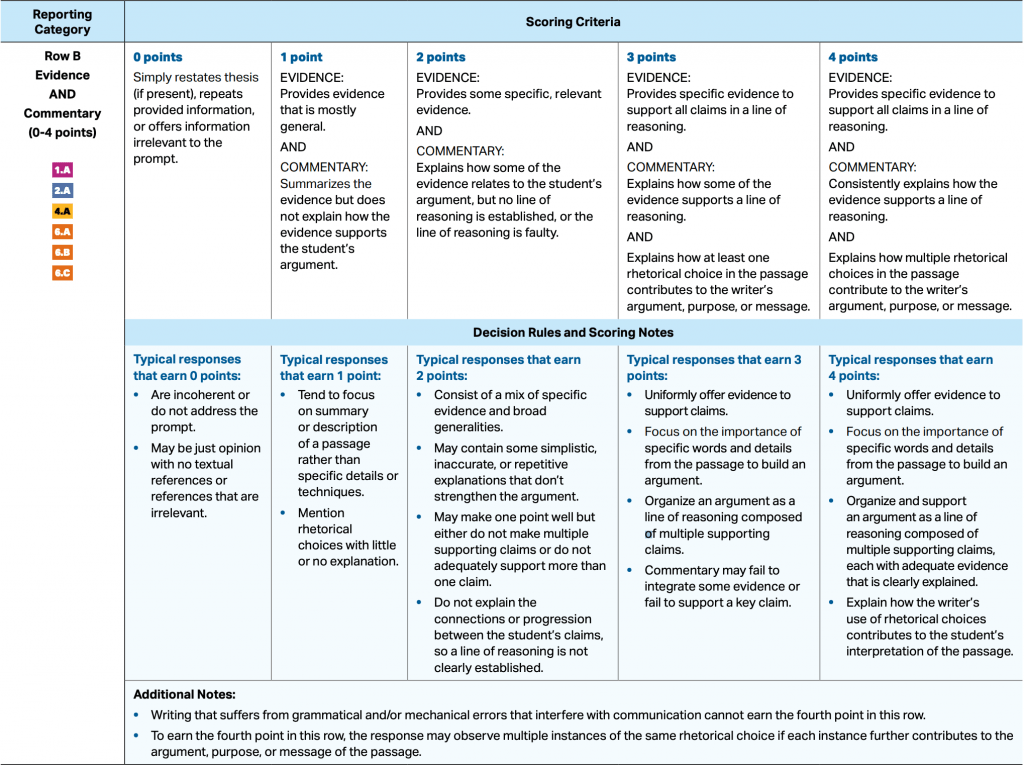
- Gives information irrelevant to the prompt
- Explains how multiple rhetorical choices contribute to your understanding of the author’s argument, purpose, or message
- Pulls specific words or details from the passage that support your argument
The Additional Notes section of the rubric is also important to understand. This gives extra detail on what may or may not earn the thesis point. The main takeaways here are:
- You may address the same rhetorical choice more than once, as long you are addressing different instances of it.
- Your argument must be free of grammatical and/or mechanical errors in order to earn full points. This means that if your grammar is not solid, you can only ever earn 3 or fewer points in this section. If you struggle with grammar or syntax, check out Albert’s Grammar course to help build up those skills!
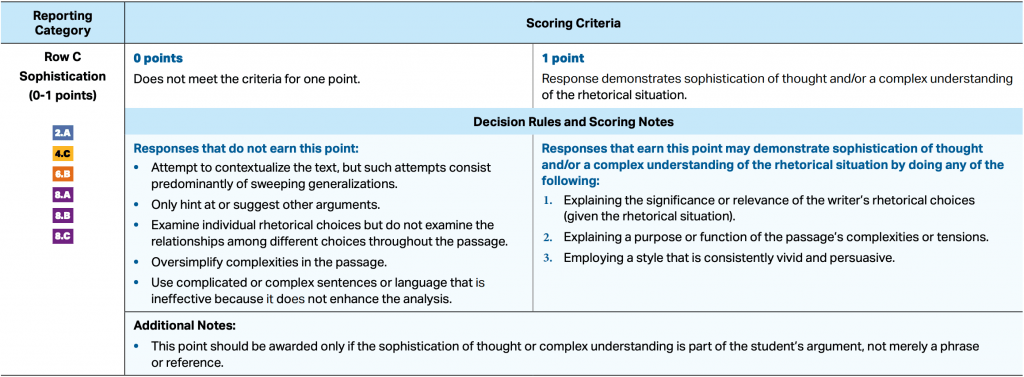
- Analyze individual rhetorical choices made by the author without also examining the relationships between the choices throughout the passage
- Oversimplify the passage
- Explains the significance of the writer’s rhetorical choices
- Explains the purpose or function of the complexities or tensions in the passage
The Argument Rubric
The argument essay is the last of the three. You will be given an open-ended topic and asked to write an evidence-based argumentative essay in response to the topic.
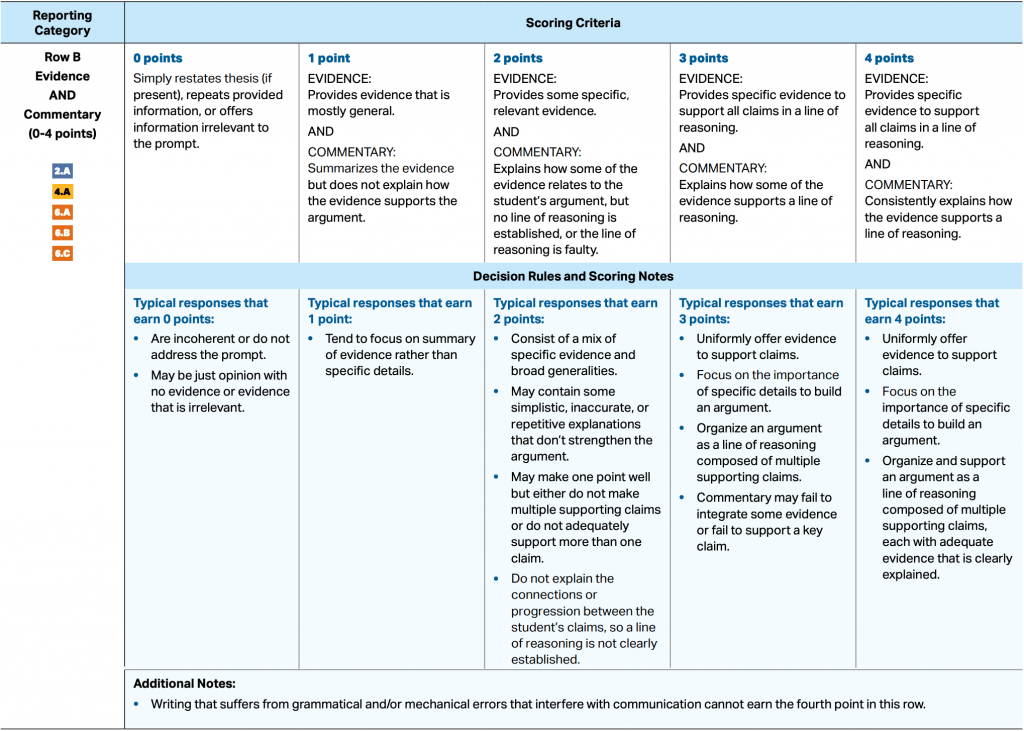
The final point above might be confusing at first glance. Giving your opinion is natural in an essay that literally asks for your opinion! But, the key is making sure to back up your opinion with evidence.
- Focuses on the importance of specific details to build your argument
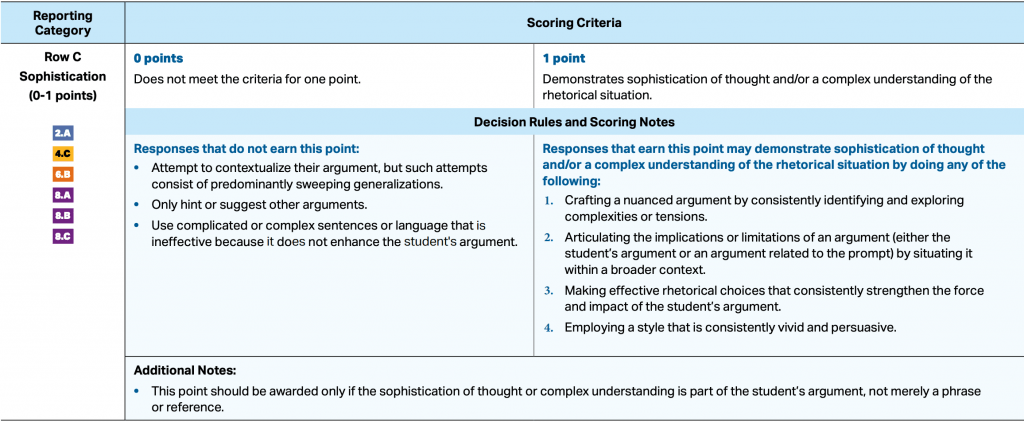
- Explores complexities or tensions between the various elements of your argument, creating a more nuanced argument
- Acknowledges implications or limitations of your own argument through counter arguments
- Acknowledges implications or limitations of the prompt’s argument by situating it within a broader context
What Can You Bring to the AP® English Language and Composition Exam?
The College Board is rather specific about what you can and cannot bring to an AP® exam. You are at risk of having your score not count if you do not carefully follow instructions. We recommend that you carefully review these guidelines and pack your bag the night before so that you do not have any additional stress on the morning of the exam.
What You Should Bring to Your AP® English Language Exam
If you’re taking the paper AP® English Language exam in-person at school, you should bring:
- At least 2 sharpened No. 2 pencils for completing the multiple choice section
- At least 2 pens with black or blue ink only. These are used to complete certain areas of your exam booklet covers and to write your free-response questions. The College Board is very clear that pens should be black or blue ink only, so be sure to double-check!
- If you are concerned that your exam room may not have an easily visible clock, you are allowed to wear a watch as long as it does not have internet access, does not beep or make any other noise, and does not have an alarm.
- If you do not attend the school where you are taking an exam, you must bring a government issued or school issued photo ID.
- If you receive any testing accommodations , be sure that you bring your College Board SSD Accommodations Letter.
What You Should NOT Bring to Your AP® English Language Exam
If you’re taking the paper AP® English Language exam in-person at school, you should not bring:
- Electronic devices. Phones, smartwatches, tablets, and/or any other electronic devices are expressly prohibited both in the exam room and break areas.
- Books, dictionaries, highlighters, or notes
- Mechanical pencils, colored pencils, or pens that do not have black/blue ink
- Your own scratch paper
- Reference guides
- Watches that beep or have alarms
- Food or drink
This list is not exhaustive. Please check with your teacher or testing site to make sure that you are not bringing any additional prohibited items.
How to Study for AP® English Language and Composition: 7 Steps
Start with a diagnostic test. Ask your teacher if they can assign you one of our full-length practice tests as a jumping-off point. Your multiple choice will be graded for you, and you can self-score your FRQs using the College Board’s scoring guidelines. If you would prefer to take a pencil and paper test, Princeton Review or Barron’s are two reputable places to start. Be sure to record your score.
Once you’ve completed and scored your diagnostic, it’s time to put the results to work and create a study plan.
- If you used Albert, you’ll notice that each question is labeled with the skill that it assesses. If any skills stand out as something you’re consistently getting wrong, those concepts should be a big part of your study plan.
- If you used Princeton Review, Barron’s, or another paper test, do your best to sort your incorrect answers into the skill buckets.
The tables below sort each set of skills into groups based on their Enduring Understandings and Big Ideas.
Big Idea: RHETORICAL SITUATION (RHS)
ENDURING UNDERSTANDING: Individuals write within a particular situation and make strategic writing choices based on that situation.
Big Idea: CLAIMS AND EVIDENCE (CLE)
ENDURING UNDERSTANDING: Writers make claims about subjects, rely on evidence that supports the reasoning that justifies the claim, and often acknowledge or respond to other, possibly opposing, arguments.
Big Idea: REASONING AND ORGANIZATION (REO)
ENDURING UNDERSTANDING: Writers guide understanding of a text’s lines of reasoning and claims through that text’s organization and integration of evidence.
Big Idea: STYLE (STL)
ENDURING UNDERSTANDING: The rhetorical situation informs the strategic stylistic choices that writers make.
Once your list of practice questions is complete, check out our 5 AP® English Language and Composition Multiple Choice Study Tips for some pointers.
Now that you’ve got your multiple-choice study plan in place, it’s time to make a plan for the FRQs. You should have self-scored your essays using the College Board’s scoring guidelines . If you notice that there is one particular prompt you struggled with, use Albert’s AP® Lang FRQ prompts for more practice!
If you didn’t struggle with a particular prompt as much as you did a particular part of the rubric, try to figure out where you went wrong. Does your thesis restate the prompt instead of proposing your own position? Did you remember to provide evidence but forget to bolster it with commentary? Maybe your word choice wasn’t varied enough to earn the sophistication point. Whatever element you struggled with, have a look at our 5 AP® English Language and Composition FRQ Study Tips for some expert advice.
Once you’ve compiled your entire study plan using the link above and identified the skills you need to practice, it’s time to implement your plan! Check your calendar. How many days, weeks, or months do you have until your exam? Pace your studying according to this time frame. Pro-tip: If you only have a few weeks or days to go, prioritize the skills that you scored the lowest on.
About halfway through your study schedule, plan to take a second diagnostic test to check your progress. You can either have your teacher assign another full-length Albert practice test or use one of the additional practice tests included in whatever AP® English Language and Composition review book you purchased. Use these results to inform the rest of your study schedule. Are there skills that you improved on or scored lower on this time? Adjust accordingly, and use our tips in the next section to guide you.
AP® English Language and Composition Review: 15 Must-Know Study Tips
Like anything else, learning to read and write at the AP® level takes time and practice. Whether this is the first AP® class you’ve taken or you’re just looking to brush up on your study skills, this list of tips will put you in a position to earn a passing score in May.
5 AP® English Language and Composition Study Tips for Home
1. Read. Read widely. Read constantly. Read everything.
There’s no substitute for reading. Reading has a number of benefits: a more impressive vocabulary, a better understanding of varied sentence structure and syntax, facility analyzing how and why authors make specific rhetorical choices. The more you read, the better equipped you will be to ace this exam.
2. Flashcards are your friend.
You will need to have a strong understanding of literary devices and rhetorical techniques, and you don’t want to waste time scrambling for definitions on exam day. Make yourself some flashcards with the most common literary devices and rhetorical techniques, and don’t forget to include grammar and punctuation there too. After all, a writer’s use of grammar and punctuation has as much impact on their prose as the words they use!
3. Take your homework assignments seriously, especially summer assignments.
Your teacher didn’t ask you to read that book for no good reason, or to write that essay just because! Summer assignments help to ensure that you are starting your school year off on the right foot. Every time that you complete a homework assignment, you are one step closer to earning a passing score on your exam. “Practice makes perfect” is a well-known phrase for a reason!
4. Seek out extra opportunities for practice!
Many practice books are available for purchase, and sometimes you can even find e-book versions to check out from your local library. Princeton Review and Barron’s are the most popular, but tons more can be found with a simple Google search.
5. Study with your friends!
Studying alone can sometimes be monotonous, and you might not have a lot of motivation if the only person holding you accountable is you. Forming study groups with friends and classmates ensures that you are held accountable, and it never hurts to have multiple perspectives on an essay question or multiple-choice answer. Plus, it’s just plain more fun.
5 AP® English Language and Composition Multiple Choice Study Tips
1. practice answering multiple-choice questions as often as you can. .
AP® English Language and Composition multiple choice questions will fall into one of the following buckets: rhetorical situation, claims and evidence, reasoning and organization, and style. If these categories look familiar to you, that’s because these are also the four Big Ideas outlined in the AP® Lang CED .
2. Exercise your close-reading skills.
The true key to acing the multiple choice section of this exam is staying engaged with the passages provided to you and actively reading. Active reading looks different to different people, so find what works best for you! For some, this can mean annotating as they read the passage. For others, this can mean reading the passage more than once: the first time just to scan for important information, and the second time to gain a deeper understanding.
3. Look over the questions before reading the passage.
This tip doesn’t work for all readers, but it can be helpful if you’re someone who gets easily distracted when reading! If you find your mind wandering when reading AP® Lang passages, knowing the questions beforehand can give your brain a purpose to focus on.
4. Use process of elimination.
Typically, an AP® Lang multiple choice question will have one or two answer choices that can be crossed off pretty quickly. See if you can narrow yourself down to two possible answers, and then choose the best one. If this strategy isn’t working on a particularly difficult question, it’s perfectly okay to circle it, skip it, and come back to it at the end.
5. Remember that it doesn’t hurt to guess.
Guessing on every single question isn’t a good strategy, of course, but you are scored only on the number of correct answers you give, not the number of questions you answer.
5 AP® English Language and Composition FRQ Study Tips
1. practice answering questions from the college board’s archive of past exam questions. .
Typically, the same skills are assessed from year to year, so practicing with released exams is a great way to brush up on your analysis skills.
2. Time yourself.
On test day, you are free to work on all three essays at your own pace so long as you finish within the 2-hour and 15-minute time frame. But, College Board directions recommend that you spend no longer than 40 minutes on each individual essay—not including the 15-minute reading period. So, while you’re practicing with the archive linked in Tip #1, be sure to have a timer handy!

3. Use the rubric!
The best part about the AP® English Language and Composition revised rubrics and scoring guidelines is that it’s very clear what elements are needed to earn full credit for your essay. Ensure that your thesis statement is clear and defensible; you provide specific evidence and commentary that supports your thesis; and you develop a clear and compelling argument.
4. Pay attention to the task verbs used in your FRQ prompts.
The College Board deliberately includes these to help you guide your response. Task verbs you’ll see on the exam are: analyze, argue your position, read, synthesize, and write. Further breakdown of each of these task verbs can be found at the bottom of this College Board Writing Study Skills list.
5. Know your rhetorical devices and techniques.
While you don’t need to call out these techniques and devices by name, you do need to know their purpose and effect on the passage. For example, maybe you know that the author is deliberately understating something for effect and to draw attention to something, but you can’t remember that the term for this is litotes. As long as you can successfully show this understatement’s effect on the overall piece and connect it back to your thesis, you’ll be okay.
The AP® English Language and Composition Exam: 5 Test Day Tips to Remember
1. get everything ready to go the night before..
Nobody wants to be scrambling around the morning of the exam with a million things left to do! Make sure you have everything from our What You Should Bring list in your backpack and ready to go.
2. Make sure you know where your testing site is and how to get there, especially if you’re taking the exam someplace other than your own school.
If you’re getting a ride from a parent or friend, be sure they know the address beforehand. If you’re taking public transit, check the schedule. Don’t get too comfortable if you are taking your exam at your own school. Be sure you know the room number! This is something small but impactful that you can do to reduce your stress the morning of your exam.
3. Be sure to eat.
We know, every teacher tells you this, but it’s for a good reason! If you’re hungry during the exam, it might be harder for you to focus, leading to a lower score or an incomplete exam. Making sure that you’ve eaten before taking your exam eliminates one less distraction, helping you stay focused and on task.
4. Bring mints or gum with you.
The rules say that you can’t have food or drink in the testing room, but mints and/or gum are usually allowed unless it’s against your testing site’s own rules. If you find yourself getting distracted, pop a mint in your mouth! This can help to keep you more awake and focused.
5. Breathe! Seriously, breathe.
If you’ve followed the rest of the tips in this post, listened to your teacher, and done your homework, you’re well-prepared for this exam. Trust that you have done all you can do to prepare and don’t cram the morning of. Last-minute studying helps no one!
AP® English Language and Composition Review Notes and Practice Test Resources
Write space.

This site provides AP® Lang students and teachers with resources on rhetorical analysis, synthesis, argument, grammar support, and much much more to help guide you through the AP ® English Language and Composition exam.
How to Guide for Rhetorical Analysis Essays
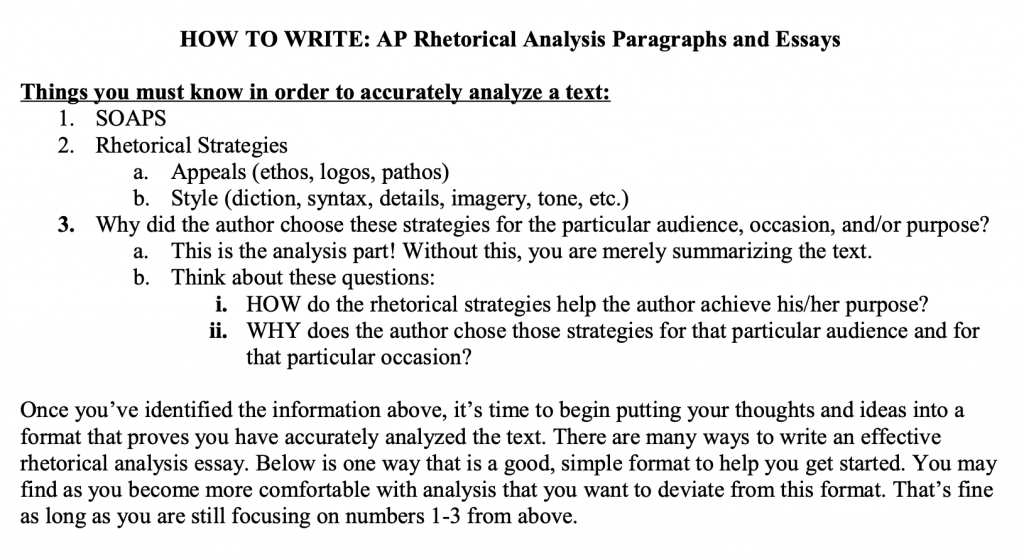
This step-by-step guide will take you through writing a rhetorical analysis essay from beginning to end.
AP® English Language and Composition Survival Guide
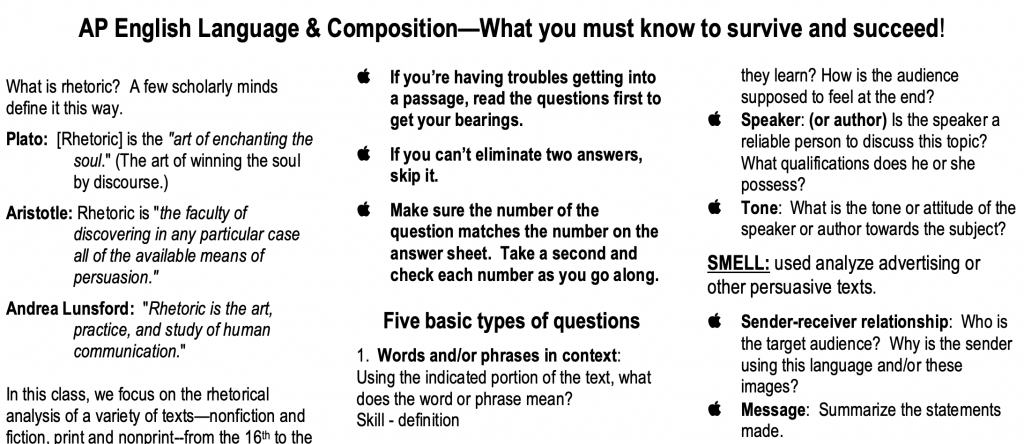
This survival guide is a one-stop-shop for everything you need to about multiple choice questions, essay writing, rhetorical terms, and more!
Ms. Effie’s Lifesavers

If you’re a seasoned AP® English teacher, Ms. Effie (Sandra Effinger) probably needs no introduction! Ms. Effie’s Lifesavers has helped many an AP® Lang (and Lit!) teacher plan effective and thoroughly aligned lessons and assignments. Sandra was an AP® Reader for many years, so she knows her stuff. She has tons of free content on her page, as well as a Dropbox full of AP® English goodies for anyone who makes a donation via her PayPal.
AP® Study Notes

This site has some great sample essays written at the AP® level. They also have a section dedicated to rhetorical terms, which is great if you want to make flashcards for review.
Summary: The Best AP® English Language and Composition Review Guide
Remember, the structure of the AP® Lang exam is as follows:
Because AP® English Language and Composition is a skills-based course, there’s no way to know what specific passages or topics might make it onto the official exam. But, we do know exactly which skills will be assessed with which passages, so it’s best to center your studying around brushing up on those skills!
Start with a diagnostic test, either on Albert or with a pencil and paper test via Princeton Review or Barron’s . Once you’ve completed and scored your diagnostic, follow our 7 steps on how to create an AP® English Language and Composition study plan.
Read! The more you read, the better equipped you will be to ace this exam.
Practice answering multiple choice questions on Albert and free-response questions from The College Board’s archive of past exam questions.
Interested in a school license?
Popular posts.

AP® Score Calculators
Simulate how different MCQ and FRQ scores translate into AP® scores

AP® Review Guides
The ultimate review guides for AP® subjects to help you plan and structure your prep.

Core Subject Review Guides
Review the most important topics in Physics and Algebra 1 .

SAT® Score Calculator
See how scores on each section impacts your overall SAT® score

ACT® Score Calculator
See how scores on each section impacts your overall ACT® score

Grammar Review Hub
Comprehensive review of grammar skills

AP® Posters
Download updated posters summarizing the main topics and structure for each AP® exam.
Interested in a school license?

Bring Albert to your school and empower all teachers with the world's best question bank for: ➜ SAT® & ACT® ➜ AP® ➜ ELA, Math, Science, & Social Studies aligned to state standards ➜ State assessments Options for teachers, schools, and districts.
AP English Language and Composition Essay Scoring
August 21, 2021, how ap english language and composition essays are graded and scored.
When it comes time to make judgments about writing , the word "effectively" comes up repeatedly. It’s a popular word because it’s easy to use. But it’s also hard to define. It means so much, and yet so little. You probably know effective writing when you see it, but what the AP English Language and Composition folks have in mind is the thoughtful organization of ideas, appropriate word choice, proper syntax, varied sentence structure, a mature style of writing, sensible paragraphing, coherent development, and correct mechanics (grammar, spelling, and punctuation).
AP readers don’t sit there with a checklist to see whether your essay meets all these criteria, however. Rather, they read it holistically, meaning that they read it quickly for an overall impression of your writing and then assign your essay a grade from 1 (low) to 5 (high). Readers are trained to look for clearly organized, well-developed, and forceful responses that reveal a depth of understanding and insight.
Frankly, the 40 minutes suggested for each essay is not a great deal of time to read the question, plan what you will say, write a few hundred words, edit and proofread your draft, and submit a finished piece of work. In effect, you must condense into a short time what would normally take far longer. A saving grace, however, is that the AP test readers don’t expect three polished pieces of immortal prose, just three competently written essays.
Each year in early June, thousands of college and high school teachers get together to read and evaluate the essays written by students like you from across the country and overseas. Readers are chosen for their ability to make sound judgments about student writing and are trained to use a common set of scoring standards.
Each essay is read by a different reader—an experienced English teacher who doesn’t know your name, your school, your gender, or anything else about you. Nor do readers know the score you earned on other essays or on the multiple-choice questions. They rate essays according to standards that customarily apply to those written in college-level English courses. A score of 1–5 is assigned to each essay, the same scale used to report AP test results.
As part of their training, AP essay readers are given guidelines to ensure that all essays are evaluated as fairly and uniformly as possible. Readers are instructed:
- To read an essay only once
- To read it quickly
- To read primarily for what the writer has done well in terms of organization, word choice, clarity, purpose, mechanics of writing, and so on
- To assign a grade promptly
- To ignore poor handwriting as much as possible
- Not to penalize a well-developed but unfinished essay
- Not to penalize the writer for supporting or rejecting a particular point of view on an issue
- Not to consider length as a criterion of evaluation
- To keep in mind that even a marginal response to the question should be judged according to the logic of the argument developed by the writer
- To remember that each essay is a first draft written under pressure in about 40 minutes by a seventeen- or eighteen-year-old.
Interpreting AP English Language and Composition Essay Scores
What do AP essay scores tell you about your writing? You’ll find some answers below, and you’ll also see what AP essay readers think about while on the job.
- 5: A score of 5 represents student writing at its best. It attests to a high level of control of several crucial elements of effective writing: insightful thinking, an ability to convey ideas clearly and succinctly, and competence in organizing ideas to fulfill a specific purpose. Minor flaws in analysis, prose style, or mechanics may creep into the text of an essay rated 5, but they do no damage.
- 4: An essay earning a 4 is well-written and organized. In most ways it demonstrates the student’s ability to manage several elements of effective writing, such as clearly articulating the intent of the essay and supporting it with appropriate evidence arranged in a purposeful sequence. Errors, if any, are relatively inconsequential.
- 3: A score of 3 indicates a respectable level of writing competence. The main idea may remain in focus throughout the essay, but the text may contain occasional soft spots, perhaps in its development of important ideas or in its organization or use of language. Despite such short- comings, the essay is an acceptable piece of writing.
- 2: An essay scored 2 demonstrates a weak grasp of essay-writing basics. It may contain a main idea, but it is neither well-articulated nor sufficiently developed. Paragraphs lack unity and are randomly organized. Awkward expression, sentence errors (e.g., fragments and run-ons), and mistakes in standard usage undermine the essay’s quality.
- 1: A score of 1 indicates that the piece submitted bears slight resemblance to an acceptable AP essay. It suggests that the writer has had limited instruction or experience in responding to AP prompts. Numerous weaknesses—from rambling, disjointed paragraphs to irrelevant ideas— signify weak control of written language and may leave readers unsure of what the writer is trying to say.
Scoring Your Own AP English Lang and Comp Essays
Evaluating your own essays takes objectivity that can’t be acquired overnight. In effect, you’ve got to disown your own work—that is, view it through the eyes of a stranger—and then judge it as though you have no stake in the outcome. A word of caution: Don’t expect to breeze through the evaluations. Set aside plenty of time. Many English teachers vividly recall their snail-like progress as novice essay readers—sometimes spending hours on grading a single essay and rereading it again and again. In short, scoring essays can be challenging, and it takes practice.
If you accept the challenge, begin by reading the following essay-writing instructions (printed in boldface). On the exam, these instructions are included as part of the prompt for each essay. In effect, they are your essays’ ingredients. Because AP readers will look for evidence that you have followed these instructions as they score your essays, it’s important for you to understand what each one tells you to do.
Essay Grading Tip #1: Respond to the prompt with a thesis that may establish a line of reasoning.
Each of your essays must have a thesis, or main idea. It may be placed anywhere in your essay, and can be built in as a separate sentence, a part of a sentence, or even as pieces of two or more sentences. Sometimes the thesis need not be stated at all if the contents of the essay make the main idea so obvious that it would be redundant to spell it out.
However you construct the thesis, it must in some way reflect the purpose of the assignment—a different one for each of the essays: 1) to use published sources to support your position on an issue; 2) to analyze the rhetoric in a given passage; and 3) to write a convincing argument backed up by evidence drawn from your reservoir of knowledge and experience. Ideally, the thesis of your essay should be visible to the reader from the start, or at least soon thereafter.
The thesis may also “establish a line of reasoning.” That is, it may explain how you intend to support your essay’s main idea. For instance, in the synthesis essay, you may plan to discuss the issue by citing ideas drawn from two of the textual sources and by statistics found in a chart or graph. Or, the thesis of your argument essay may state or imply your intention to build a case using evidence based on your reading or perhaps on your observations or personal experience.
(The following instruction applies only to Essay 1, the Synthesis Essay. See 2B for the instruction that applies only to Essays 2 and 3.)
Essay Grading Tip #2a: Provide evidence from at least three of the provided sources to support the thesis.
Indicate clearly the sources used through direct quotation, paraphrase, or summary. Sources may be cited as Source A, Source B, etc., or by using the descriptions in parentheses.
Although your thesis may be based on your personal opinion on the issue, build your argument with references to the sources. You needn’t depend solely on the sources with which you agree. By refuting those opposed to your views, you might strengthen your own argument.
(The following instruction applies only to Essays 2 and 3, the Rhetorical Analysis and the Argument. See 2A [above] for the instruction that applies to Essay 1.)
Essay Grading Tip #2b: Select and use evidence to develop and support your line of reasoning.
This instruction reminds you to formulate a claim and support it with convincing and relevant evidence drawn from your studies, reading, observation, and personal experience. You have abundant choices: facts, anecdotes, statistics, analogies, theories, examples, testimonies, expert opinions, your own values and recollections, and more—whatever will bolster your main idea. Each piece of evidence need not be presented as a separate statement. That is, consider blending the evidence gradually into the development of your entire essay.
Essay Grading Tip #3: Explain the relationship between the evidence and the thesis.
Whatever evidence you choose, be sure to explain its pertinence to your thesis. Although the connection may be obvious to you, there is no guarantee that a reader will see it as you do. Connections might be pointed out with stand-alone statements or pronouncements, or less blatantly, by artfully weaving them into the development of the entire essay.
Essay Grading Tip #4: Demonstrate an understanding of the rhetorical situation.
Each of the three essays has a distinct “rhetorical situation,” or purpose. Rather than stating it outright, you might demonstrate your grasp of the rhetorical purpose by implication—that is, simply by fulfilling the assignment. By writing an essay that takes a stand on a particular issue and citing material from three of the given sources, you will have shown comprehension of the Synthesis Essay’s rhetorical situation. Likewise, following the stated instructions for each of the other essays is evidence enough that you’ve understood the rhetorical situation.
Essay Grading Tip #5: Use appropriate grammar and punctuation in communicating your argument.
Use the conventions of standard written English. Unless you need them for effect, avoid street talk, emojis, acronyms, and the abbreviations so common in e-communications.
AP Biology Resources
- About the AP Biology Exam
- Top AP Biology Exam Strategies
- Top 5 Study Topics and Tips for the AP Biology Exam
- AP Biology Short Free-Response Questions
- AP Biology Long Free-Response Questions
AP Psychology Resources
- What’s Tested on the AP Psychology Exam?
- Top 5 Study Tips for the AP Psychology Exam
- AP Psychology Key Terms
- Top AP Psychology Exam Multiple-Choice Question Tips
- Top AP Psychology Exam Free Response Questions Tips
- AP Psychology Sample Free Response Question
AP English Language and Composition Resources
- What’s Tested on the AP English Language and Composition Exam?
- Top 5 Tips for the AP English Language and Composition Exam
- Top Reading Techniques for the AP English Language and Composition Exam
- How to Answer the AP English Language and Composition Essay Questions
- AP English Language and Composition Exam Sample Essay Questions
- AP English Language and Composition Exam Multiple-Choice Questions
AP Human Geography Resources
- What’s Tested On the AP Human Geography Exam?
- AP Human Geography FAQs
- AP Human Geography Question Types and Strategies
- Top 5 Study Tips for the AP Human Geography Exam
FOLLOW ALONG ON SOCIAL
- AP Test Prep: English Composition Essay Scoring
- High School
- AP Biology: Evolution
- AP Biology: Coevolution of Predator and Prey
- AP Biology: Excretory Systems
- AP Biology: Insight into Free-Response Questions
- AP Economics: Micro & Macro Basics
- AP Economics: What Are the Functions of Money?
- AP English Language and Composition: Essays
- AP English Language and Composition: Exam Format
- AP English Language and Composition: How Your Essays Are Scored
- AP English Language and Composition: Kinds of Questions
- AP English Language and Composition: Multiple-Choice Section
- AP English Language and Composition: Pace Your Essay Writing
- AP English Language and Composition: Reading Passages
- AP English: Pacing Your Exam Essays
- AP Essay Writing: Satire as a Subject
- AP European History: World War I (1914-1918)
- AP Spanish Language: Cloze Passages
- AP Test Prep: The Bill of Rights
- AP Test Prep: Evolution of the Mass Media
- AP Test Prep: The Expansion of Suffrage
- AP Test Prep: Humanism in the Renaissance
- How to Read a History Textbook
Each exam essay is read by experienced, well-trained high school AP teachers or college professors. The essay is given a holistic score from 1 to 9. (A score of 0 is recorded for a student who writes completely off the topic — for example, "Why I think this test is a waste of money." A student who doesn't even attempt an essay, who leaves a blank page, will receive the equivalent of a 0 score, but it is noted as a dash [—] on the reader's scoring sheet.)
The reader assigns a score based on the essay's merits as a whole, on what the essay does well; the readers don't simply count errors. Although each essay topic has its own scoring rubric (or guide) based on that topic's specific information, essay-scoring guides generally encompass four essential points. AP readers want your essay to be (1) on topic, (2) well organized, (3) thoroughly developed, and (4) correct in mechanics and sophisticated in style.
High Score (8-9)
High-scoring essays thoroughly address all the tasks of the essay prompt in well-organized responses. The writing demonstrates stylistic sophistication and control over the elements of effective writing, although it is not necessarily faultless. Overall, high-scoring essays present thoroughly developed, intelligent ideas; sound and logical organization; strong evidence; and articulate diction.
Medium-High Score (6-7)
Medium-scoring essays complete the tasks of the essay topic well — they show some insight but usually with less precision and clarity than high-scoring essays. There may be lapses in correct diction or sophisticated language, but the essay is generally well written.
Medium Score (5)
Essays that earn a medium score complete the essay task, but with no special insights; the analysis lacks depth and merely states the obvious. Frequently, the ideas are predictable and the paragraph development weak. Although the writing conveys the writer's ideas, they are presented simplistically and often contain lapses in diction or syntax.
Medium-Low Score (3-4)
These essays are weaker than the 5 score because the writer overlooks or perhaps misreads important ideas in the passage. The student may summarize the passage's ideas instead of analyzing them. Although the writer's ideas are generally understandable, the control of language is often immature.
Low Score (1-2)
These essays demonstrate minimal understanding of the topic or the passage. Perhaps unfinished, these essays offer no analysis of the passage and little or no evidence for the student's ideas. Incorrect assertions may be made about the passage. Stylistically, these essays may show consistent grammatical problems, and sentence structure is usually simple and unimaginative.
If 3 x 2 + 4 x – 4 = 2 x 2 + 13 x + 18, then x =

cannot be solved using factoring

IMAGES
VIDEO
COMMENTS
6 – Adequate. Essays earning a score of 6 adequately develop a position on the value of exploring the unknown. The evidence and explanations appropriately and sufficiently support the student’s position, and the argument is coherent and adequately developed. The writing may contain lapses in diction or syntax, but generally the prose is clear.
Download free-response questions from past exams along with scoring guidelines, sample responses from exam takers, and scoring distributions. If you are using assistive technology and need help accessing these PDFs in another format, contact Services for Students with Disabilities at 212-713-8333 or by email at [email protected].
2021 AP ® English Language and Composition Sample Student Responses and Scoring Commentary Inside: Free Response Question 3 • Scoring Guideline • Student Samples • •Scoring Commentary
AP English Language Scoring Rubric, Free-Response Question 1-3 | SG 1 Scoring Rubric for Question 1: Synthesis Essay 6 points Reporting Category Scoring Criteria Row A Thesis (0-1 points) 4.B 0 points For any of the following: • There is no defensible thesis. • The intended thesis only restates the prompt.
There is an essay called the synthesis essay which is within the free response question section of the AP® English Language exam. The synthesis essay rubric dictates that you use at least three of the sources in your essay to get a high score. If you are writing a synthesis essay and you did not include sources, then give yourself a 2. As you ...
4. Gather evidence. After deciding what your thesis will be, you need to gather evidence to support it. The key to getting a 9 on an AP English essay is coming up with plenty of evidence. [8] If the prompt provides you with a passage to analyze, underline quotes that will support your thesis.
9 − Essays earning a score of 9 meet the criteria for the score of 8 and, in addition, are especially sophisticated in their argument, thorough in their development, or impressive in their control of language. 8 − Effective Essays earning a score of 8 effectively analyze* how Luce uses this introduction to prepare the audience for her message.
5 AP® English Language and Composition FRQ Study Tips. 1. Practice answering questions from The College Board’s archive of past exam questions. Typically, the same skills are assessed from year to year, so practicing with released exams is a great way to brush up on your analysis skills. 2.
Nor do readers know the score you earned on other essays or on the multiple-choice questions. They rate essays according to standards that customarily apply to those written in college-level English courses. A score of 1–5 is assigned to each essay, the same scale used to report AP test results. Essay Score.
Each of the three essays within the AP English Language and Composition exam equals one-third of the total essay score, and the entire essay (free-response) section equals 55% of the total exam score. Each exam essay is read by experienced, well-trained high school AP teachers or college professors. The essay is given a holistic score from 1 to 9.